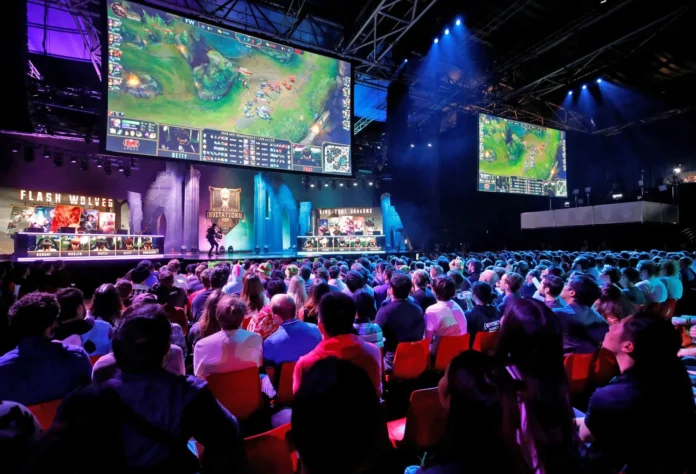Esports and sport have often been compared. However, many researchers, coaches and athletes have been discussing this topic for many years. Sport and esport seem to differ in many ways, but they also share some common features. This topic has also been discussed several times in recent years. The question of whether esports should be considered a sport has been a hot topic in recent years. Some argue that esports are not sports because they consist of video games and have no physical characteristics, while others think it is unfair to exclude esports from the scope of sport simply because it is digital.
The popularity of esport have been increasing recently, millions of people enjoy pro tournaments every year, there are even a lot of people gaining money from it in betting sites like BetFury Esports to add more fun to them, undeniably they’ve became part of our culture and apparently they’ve come to stay.
What is sport?

There are many different definitions about what sports are. Most commonly, sports are considered to be a competitive physical activity that follows rules, has a goal and results in a winner-loser outcome. In only one of these senses, esports does not meet these criteria.
Another definition is that sports are activities that require physical effort and skill. In this sense, esport meets these requirements.
The third definition of sport refers to the public, especially when sports are played on television. Both e-sports and physical sports fit this description.
The second definition is that sports are social institutions with an economic, political and ideological function. This definition refers less to the activity itself than to the context in which it takes place.
This definition is useful because it highlights the fact that sports are embedded in society and culture in ways that are not always obvious to those who practice sports or consider them as entertainment.
What is Esport?

The International Olympic Committee (IOC) defines esports as “electronic sports” and “competitive games”. In this sense, esports are video games played competitively.
For most people to recognise esports as a sport, it would have to meet the criteria for a sport described in one of the above definitions.
Many people who oppose the recognition of esports as a sport point out that esports refers to video games. They therefore argue that esports are not a sport because it does not require physical effort or skill.
In this sense, esports are more comparable to video games than to sports.
However, many sports have digital elements, such as virtual reality training simulations and computer-generated statistics on teams and players. Although different from video games, they are also part of digital and virtual technology.
One way of looking at this controversy is to ask whether e-sports should be treated as sports in terms of how they should be regulated and organized. If the answer is yes, the next question is how to define esports. In other words, what is esports and how does it differ from other sports?
Why does no one know if esports are a sport?

It is important to note that there is no ambiguity within the sporting world as to whether esports are a sport. All sports organizations, such as those belonging to the Olympic family, recognize esports as a sport.
The confusion among the public is due to a lack of knowledge about the details of esports and sports. Many people do not understand the subtle differences between these activities and therefore do not know whether esports are a sport.
Other people who confuse esports and sports are probably resistant to change or perhaps just stubborn. They may believe that esport has no place in the world of sports and want to keep the two as separate as possible, when in fact they already have a lot in common. This website has an article explaining the difference.
Is esports a sport or not?

This is a difficult question to answer. E-sports are new and there are no set criteria for what makes an activity a sport. The IOC and other sports organizations have not yet established criteria for defining what constitutes sport.
There is even a debate in the sporting world as to whether esports should be considered a sport, as there are no defined criteria for sport.
Some experts also argue that esports is not a sport because it focuses too much on strategy and mental skills rather than physical skills.
Many who argue that esports are not a sport have a specific definition of sport in mind that esports does not meet.
Since there are no agreed criteria for what makes a sport a sport, the best that can be done is to argue why esports are a sport, based on its similarities to other activities that are already considered sports.
Should we stop calling it “esports”?

Some argue that esports should be called a sport, but that it should instead be reclassified as football or another sport.
This idea is absurd because it is based on a misunderstanding of what sports are. Those who advocate this idea confuse the definition of sport with the fact that esports are digital.
The best solution to the conflict over whether esports are a sports are to expand the current definition of sport to include competitive video games.
Esports are sports because they are competitive, require skill and physical effort, are governed by rules, have a goal (to win), and have an outcome in which one wins or loses.
Conclusion
What we call esports doesn’t matter. What matters is that esports are a sport and should be treated as such.
It is a growing industry that is expected to generate $2.85 billion in annual revenues by 2020. Esports are also a global industry with players and fans from all over the world. Given the scale and importance of esports, it is only a matter of time before it is recognized as a legitimate sport. For esports fanatics, Parimatch is the ultimate sports betting website.








